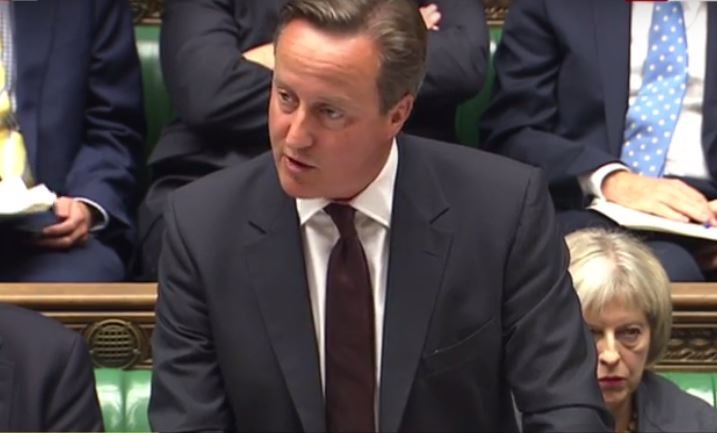David Cameron faces legal challenge over drone attack that killed two British Isis fighters in Syria
Green party politicians join forces with human rights charity Reprieve to start judicial review process against decision to kill targets in Syria

Your support helps us to tell the story
From reproductive rights to climate change to Big Tech, The Independent is on the ground when the story is developing. Whether it's investigating the financials of Elon Musk's pro-Trump PAC or producing our latest documentary, 'The A Word', which shines a light on the American women fighting for reproductive rights, we know how important it is to parse out the facts from the messaging.
At such a critical moment in US history, we need reporters on the ground. Your donation allows us to keep sending journalists to speak to both sides of the story.
The Independent is trusted by Americans across the entire political spectrum. And unlike many other quality news outlets, we choose not to lock Americans out of our reporting and analysis with paywalls. We believe quality journalism should be available to everyone, paid for by those who can afford it.
Your support makes all the difference.David Cameron is facing a legal challenge over his decision to authorise drone attacks that killed two British Isis fighters in Syria last month.
The Prime Minister defended the attack – the first time an RAF strike has targeted a British citizen in a foreign country – insisting it was “entirely lawful” and said the Government was “exercising Britain’s inherent right in self-defence”.
But the Green party’s MP Caroline Lucas and peer Baroness Jones have joined with human rights charity Reprieve and law firm Leigh Day to start the process of a judicial review over the Government’s “targeted killing” of people in countries where Britain is not at war.
In a Letter Before Action (LBA) they have claimed they argue that the Prime Minister either failed to formulate a “targeted killing policy” or failed to publish it , which they claim are both positions that are illegal under domestic and international law.

The Green party claims that a “combination of faulty intelligence and a lack of safeguards has seen hundreds of civilians killed” by US drone attacks in Pakistan and Yemen and fear the RAF attack in Raqqa last month will create a precedent for future secret killings without seeking parliamentary approval.
The Coalition failed to win parliamentary backing for airstrikes against President Assad’s regime in 2013 and since then the situation has complicated further, with Isis taking control of large swathes of northern Syria.
It has led to what ministers have described as the “absurd” situation where Britain is carrying out airstrikes on the jihadi terrorist organisation in Iraq but not Syria. Mr Cameron has signalled his intention to seek another parliamentary vote to approve strikes in Syria, but the election of Jeremy Corbyn as Labour leader could thwart the move.

He wants to see a diplomatic drive instead of airstrikes, bringing together a coalition of neighbouring countries, Russia, the US and the EU to look for a political solution to the conflict.
Mr Corbyn has also questioned the legal basis for the RAF strikes, which killed Cardiff-born Reyaad Khan and Ruhul Amin, from Aberdeen, on August 21.
Mr Cameron announced the attack in a statement to MPs in the House of Commons earlier this month, but has refused to disclose what evidence led him to give the go-ahead.
It has since emerged that he has approved a secret hit-list of around 10 Isis fighters who the RAF can take out at a moment’s notice if the opportunity arises.
Ms Lucas said: “The Government appears to have adopted a ‘Kill Policy’ in secret –without Parliamentary debate or the prospect of proper independent scrutiny. Sanctioning lethal drone attacks on British citizens is a significant departure from previous policy, as well as potentially unlawful, and it’s deeply concerning that it has occurred without appropriate oversight.
“By refusing to publish the legal basis for these attacks, the Government has created a legal and accountability vacuum. We need to be able to determine whether the attacks – and what they signify in terms of Government policy - meet the robust conditions set out in international and domestic law.”
The letter threatening legal action accuses the Government of a lack of clarity or consistency in its various justifications for the attack, claiming it has at has variously claimed the Isis targets posed a “potential,” “direct,” “likely” or “imminent” threats to the UK.
"Such a lack of clarity as to the test which is being applied by the Government in deciding whether to pre-authorise the targeted killing of British nationals or individuals overseas raises real and serious concerns over the lawfulness of the Government's past and expected resort to the use of lethal force," the letter says.
"The Raqqa strike, and the intention of the Government to pre-authorise targeted killings in the future in countries where the UK is not at war, is of concern to the claimants and many others," the letter reads.
"The concern is heightened by the lack of clarity about the circumstances in which the Government reserves the right to kill British citizens outside of an armed conflict.
"It is unclear what, if any, policies, procedures and/or safeguards are in place to ensure that this 'new departure' is only exercised in accordance with domestic and international law."
Join our commenting forum
Join thought-provoking conversations, follow other Independent readers and see their replies
Comments